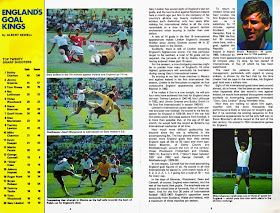Despite England's 1-0 friendly defeat to Sweden in their first match after Mexico 86, their campaign to reach the 1988 European Championship finals in West Germany had started well. A 3-0 Wembley win over Northern Ireland in October 1986 got things off to the perfect start, but now came Yugoslavia - something of an unknown quantity for Bobby Robson and most of England's fans.
Always the dark horses whenever an international competition came around, Yugoslavia were erratic in their consistency. They'd reached the finals of Euro 84 only to come bottom of their First Round group, and followed that by finishing fourth out of five teams in their qualifying group for World Cup '86.
They undoubtedly had some decent players, yet for some reason they couldn't be relied upon to gel together well when it was really necessary. This, plus the rising profile of Gary Lineker, however, would provide all the motivation England needed.
Lineker found himself on the front cover of the official programme, proudly showing off the Adidas Golden Shoe he received for scoring 30 Everton goals the previous season. Inside, Albert Sewell marked Lineker's entry into England's top 20 goalscorers chart and wondered if he might one day take top spot above Bobby Charlton. Ultimately, he'd fall one goal short of Charlton's 49, whereas both look like they'll soon be overtaken by Wayne Rooney who's currently on 46.
England's starting XI against Yugoslavia at Wembley saw only six players present that faced Argentina at the Azteca five months previously. Chris Woods replaced Peter Shilton in goal, while in midfield, Gary Mabbutt got his first call up in three years to replace Bryan Robson. It turned out to be a memorable night for the Tottenham stalwart as he opened the scoring with his one and only goal in an England shirt.
The other goal on the night came from Viv Anderson, himself a rarity on the England scoresheet. Having seen his appearances for the national team dwindle since the start of the 1980's, Anderson enjoyed a return to the side while Gary Stevens was unfit and scored his second and last international goal to complete the 2-0 win over Yugoslavia.
Bobby Robson spoke of the visitors' thorough preparations for the match and doubted whether the England camp knew just as much about the Yugoslavs. Also weighing on his mind was the paltry attendance for England's previous game against Northern Ireland. "I can't deny I was disappointed at the attendance" said Robson. "I don't consider 30,000 to be a big crowd for an England fixture at Wembley. But let me make it quite clear that I know we have no divine right to large crowds; we have to work to earn the support." No doubt he'd have been more pleased with the 60,000 that eventually turned up on the night for the Yugoslavia match.
Away from the match, the Under-21 squad was under the spotlight in Robert Steen's article 'Catch 22 For The U-21s.' England had done away with the Under-23 team in 1976 to allow greater development of players emerging from the Youth team setup, and the undoubted dividends of doing so were now been reaped. England had won the UEFA Under-21 tournament in 1982 and 1984 and were semi-finalists in 1978 and 1980. Now a new breed of players were hoping for an imminent breakthrough into the full England team under the guidance of Dave Sexton.
Among the squad of 18 named for England's first U21 qualifier of the 1986-88 campaign against Yugoslavia were some familiar names. Tony Dorigo of Aston Villa, Stuart Pearce, Des Walker and Nigel Clough of Nottingham Forest, Tony Adams and David Rocastle of Arsenal, plus Tim Flowers of Southampton in goal... A fine vintage of players, but they were to be the last group to make it to the semi-finals of the UEFA U-21 tournament until 2007 when the likes of James Milner, Anton Ferdinand and Ashley Young were the new names in the frame.
As far as the 1986-88 campaign was concerned, England fell at the final hurdle after a defeat to eventual winners France. Their side featured a couple of nobodies called Eric Cantona and Laurent Blanc, in case you were interested.
Finally, the official match programme gave a warm send-off to Vernon Edwards, the England team doctor who was a familiar sight when giving players urgent treatment on the pitch (and off it). Edwards had suffered a heart attack during the World Cup in Mexico and had reluctantly taken the decision to step down from his duties. Mel Henderson asked Edwards about his England memories and one particular tale stood out for sheer weirdness:
"Sir Alf Ramsey was in charge when Dr Edwards joined the England set-up and in 1971 they accompanied the youth squad to Czechoslovakia for the UEFA Championship more commonly known as the Little World Cup."
"He recalls: "We won the trophy but the trip was memorable from my point of view for an extraordinary incident that occurred when the entire goal rotted at ground level and collapsed on Trevor Francis."
"He received an horrendous injury and at first I feared he had fractured his leg. We seemed miles from civilisation and had a journey ahead of us to Prague for the next stage of the competition."
"I decided to apply a Plaster of Paris splint and had to do it in my bedroom. You can imagine the mess it made!"
Never mind that... since when did you hear the phrase "Match abandoned due to goalposts rotting at ground level'? What a weird football world we lived in back in 1986...
-- Chris Oakley








No comments:
Post a Comment